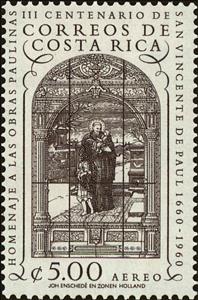Stamp: St Vincent of Paul (Costa Rica 1960)
St Vincent of Paul (Costa Rica 1960)
26 October (Costa Rica ) within release Hommage to Pauline works goes into circulation Stamp St Vincent of Paul face value 5 Costa Rican colón
| Stamp St Vincent of Paul in catalogues | |
|---|---|
| Michel: | Mi: CR 569 |
| Stamp Number: | Sn: CR C302 |
Stamp is square format.
Also in the issue Hommage to Pauline works:
- Stamp - St Louise de Marillac (1591-1660) face value 10;
- Stamp - St Vincent de Paul face value 25;
- Stamp - Louise de Marillac (1591-1660) face value 50;
- Stamp - St Vincent of Paul and "Colegio Seminario" face value 1;
- Stamp - St Vincent of Paul face value 5;
|
Data entry completed
53%
|
|
|---|---|
| Stamp St Vincent of Paul in digits | |
| Country: | Costa Rica |
| Date: | 1960-10-26 |
| Print: | Recess |
| Perforation: | 14 |
| Emission: | Air Post |
| Format: | Stamp |
| Face Value: | 5 Costa Rican colón |
Stamp St Vincent of Paul it reflects the thematic directions:
Biologically, a child (plural: children) is a human being between the stages of birth and puberty. The legal definition of child generally refers to a minor, otherwise known as a person younger than the age of majority. Child may also describe a relationship with a parent (such as sons and daughters of any age) or, metaphorically, an authority figure, or signify group membership in a clan, tribe, or religion; it can also signify being strongly affected by a specific time, place, or circumstance, as in "a child of nature" or "a child of the Sixties". There are many social issues that affect children, such as childhood education, bullying, child poverty, dysfunctional families, child labor, hunger, and child homelessness. Children can be raised by parents, by fosterers, guardians or partially raised in a day care center.
A Christian is a person who follows or adheres to Christianity, a monotheistic Abrahamic religion based on the life and teachings of Jesus Christ. Christians form the largest religious community in the world. The words Christ and Christian derive from the Koine Greek title Christós (Χριστός), a translation of the Biblical Hebrew term mashiach (מָשִׁיחַ) (usually rendered as messiah in English). While there are diverse interpretations of Christianity which sometimes conflict, they are united in believing that Jesus has a unique significance. The term Christian used as an adjective is descriptive of anything associated with Christianity or Christian churches, or in a proverbial sense "all that is noble, and good, and Christ-like." It does not have a meaning of 'of Christ' or 'related or pertaining to Christ'.
Religion is any cultural system of designated behaviors and practices, world views, texts, sanctified places, ethics, or organizations, that relate humanity to the supernatural or transcendental. Religions relate humanity to what anthropologist Clifford Geertz has referred to as a cosmic "order of existence". Different religions may or may not contain various elements ranging from the "divine", "sacred things", "faith", a "supernatural being or supernatural beings" or "some sort of ultimacy and transcendence that will provide norms and power for the rest of life". Religious practices may include rituals, sermons, commemoration or veneration (of deities), sacrifices, festivals, feasts, trances, initiations, funerary services, matrimonial services, meditation, prayer, music, art, dance, public service, or other aspects of human culture. Religions have sacred histories and narratives, which may be preserved in sacred scriptures, and symbols and holy places, that aim mostly to give a meaning to life. Religions may contain symbolic stories, which are sometimes said by followers to be true, that have the side purpose of explaining the origin of life, the Universe and other things. Traditionally, faith, in addition to reason, has been considered a source of religious beliefs. There are an estimated 10,000 distinct religions worldwide. About 84% of the world's population is affiliated with one of the five largest religions, namely Christianity, Islam, Hinduism, Buddhism or forms of folk religion.
n Christian belief, a saint is a person who is recognized as having an exceptional degree of holiness, likeness, or closeness to God. However, the use of the term saint depends on the context and denomination. In Catholic, Eastern Orthodox, Anglican, Oriental Orthodox, and Lutheran doctrine, all of their faithful deceased in Heaven are considered to be saints, but a selected few are considered worthy of greater honor or emulation. Official ecclesiastical recognition, and veneration, is conferred on some denominational saints through the process of canonization in the Catholic Church or glorification in the Eastern Orthodox Church after their approval.In many Protestant denominations saint refers broadly to any holy Christian, without special recognition or selection.




